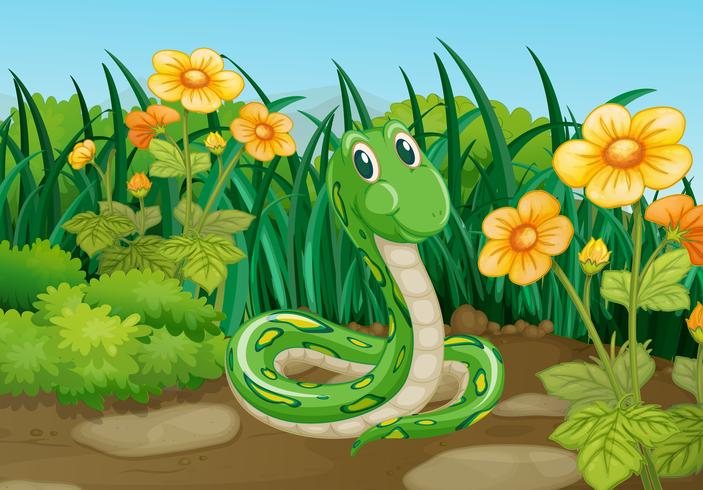
NCERT Solutions For Class 7 English Honeycomb Unit 9 Poem Garden Snake – Summary with questions and answers and MCQ. This poem is about a young boy’s fear of a garden snake and the explanation of the poem will show how the author (the child in the poem) overcame this fear. And also find NCERT Solutions For Class 7 English Honeycomb Unit 9 Poem Garden Snake below.
Read more: NCERT Solutions For Class 7 English Honeycomb Chapter 2 A Gift of Chappals
Summary of NCERT Solutions For Class 7 English Honeycomb Unit 9 Poem Garden Snake
NCERT Solutions For Class 7 English Honeycomb Unit 9 Poem Garden Snake, is a basic description of a snake that is harmless. The young narrator sees a snake in the garden and, out of terror, runs away from it. His mother tells him that such species of snakes are not at all dangerous. They merely prey on insects. After that, the young child narrator loses his anxiety and starts watching the garden snake move through the garden.

I saw a snake and ran away….
The above lines have been taken from Muriel L Sonne’s poem Garden Snake.
Some snakes are dangerous, they say;
But mother says that kind is good,
And eats up insects for his food.
So when he wiggles in the grass
I’ll stand aside and watch him pass,
And tell myself, “There’s no mistake,
It’s just a harmless garden snake!’
Conclusion of NCERT Solutions For Class 7 English Honeycomb Unit 9 Poem Garden Snake
NCERT Solutions For Class 7 English Honeycomb Unit 9 Poem Garden Snake teaches us that garden snakes are not poisonous and are harmless to humans. We also learn from the explaination that it is important to gather knowledge about any new object or creature one encounters before making one’s opinion.
Working with the Poem
Find NCERT Solutions For Class 7 English Honeycomb Unit 9 Poem Garden Snake below
Question 1. Answer the following questions:
(i) Pick out the line that suggests that the child is afraid of snakes.
(ii) Which line shows a complete change of the child’s attitude towards snakes? Read it aloud.
(iii) “But mother says that kind is good…” What is mother referring to?
Answer: (i) The line that suggests that the child is afraid of snakes is:
“I saw a snake and ran away…”
(ii) The line that shows a complete change of child’s attitude towards snakes is:
“I’ll stand aside and watch him pass,”
(iii) The mother is referring to the “garden snakes”.
Question 2: Find the word that refers to the snake’s movements in the grass.
Answer: “Wiggles” is the word that refers to the snake’s movements in the grass.
Question 3: There are four pairs of rhyming words in the poem. Say them aloud.
Answer: The four pairs of rhyming words in the poem are:
Away-say
Good-food
Grass-pass
Mistake-snake
Question 4: A snake has no legs or feet, but it moves very fast. Can you guess how? Discuss in the group.
Answer: A snake wiggles and that’s how it moves very fast although it does not have legs or feet.
Question 5: Can you recall the word used for a cobra’s long sharp teeth? Where did you come across this word first?
Answer: The word used for cobra’s long sharp teeth is “fangs”. I have heard this word while watching Discovery channel.
Short Answer Type Questions
Find NCERT Solutions For Class 7 English Honeycomb Unit 9 Poem Garden Snake below
Question 1:
Why did the narrator run away seeing the garden snake?
Answer:
The narrator thought the snake to be dangerous and out of fear ran away.
Question 2:
What does a garden snake eat?
Answer:
A garden snake survives on insects.
Question 3:
What makes the child comfortable the next time he sees the garden snake?
Answer:
The first time the child sees the snake, he is overcome with fear.
However, on being told by his mother that this particular snake is not dangerous, the child becomes comfortable the next time he encounters the garden snake.
Question 4:
What lesson does the young child narrator learn from his mother?
Answer:
The young child narrator, in his ignorance, had assumed all kinds of snakes to be dangerous. However, from his mother he learnt that not every kind of snake is dangerous some are, most are not.
This makes him peacefully admire the garden snake whenever he saw it next. Also, the narrator learnt that it is important to gather knowledge about any new object or creature one encounters before making one’s opinion.